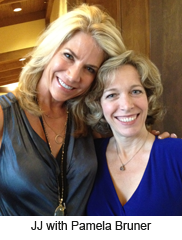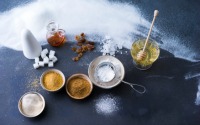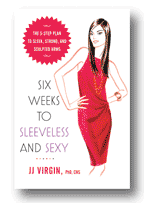![]() Want to share this with a friend? Please forward it!
Want to share this with a friend? Please forward it! ![]() Problems viewing the newsletter? View Online
Problems viewing the newsletter? View Online

Volume 4, Number 6 | Subscribe |
Questions? [email protected] |
Note From JJ
Hi %$firstname$%,
I am writing this from a beautiful resort in Dana Point, CA and getting ready to head out to enjoy the sunset :). I got to see a bunch of old friends at World's Greatest Speaker Training a few weeks ago in Santa Clara. Check  out my pal and client Pamela Bruner - she is wearing the same size as she did in high school (all because of the Virgin Diet!).
out my pal and client Pamela Bruner - she is wearing the same size as she did in high school (all because of the Virgin Diet!).
After WGST I headed to Tampa to tape my new show: Drop 7 Foods; Get Healthy Fast which is based on The Virgin Diettm. It was a blast to do and I had a great audience including my old client Rob Dekinder-Smith and my pals Dr. Steven & Nicole Masley, Dr. Scott Gebhardt, Jody and Virginia Baden. And Marcelle Pick, Donna Poulin and Dr. Anna Cabeca even flew in for it!!!
I had an interesting situation come up when i recently did a call for recipes for a collaboration cookbook - I discovered that there are some people out there who have a lot of hidden sugar in their diet! So I realized that I needed to clear up some sugar myths and mis-understandings so this week's article was born! I also realized that I was not being generous enough (which flies in the face of our company's mission) in what I was offering to those of you who shared your recipes so we have "sweetened" our deal considerably and beg forgiveness - see the info below to take advantage of our recipe drive!
Make it a great, "sugar - free" week!

Feature Article
Healthy or just a pretty name? How to make sense about sugar
Recently I sent out an email requesting healthy recipes. (There’s still time to submit yours!) There were rules. For instance: no dairy, soy, gluten, and other potentially high-sensitivity foods. Most people got this, but my other request seemed more confusing: no more than 5 grams of sugar per serving.
My email opened people’s eyes about sugar, and one reader sent the following thoughtful reply:
I don't have a recipe to submit but I just wanted you to know that you really made me think about my sugar intake from your email.
I try very hard not to use white sugar, and use brown sugar and honey whenever possible. Who knew that a banana had 17-grams of sugar? When I have them in the house I will eat them like they're candy.
On the "Important Note About Sugar" paragraph I was blown away because I thought that everything you had listed there was good for you and the best alternative to real sugar.
Thank you for the education!
I get a lot of questions from readers and at conferences about sugar. It can be confusing to make sense of the numerous names for sugar or to determine what a serving size is, but hopefully my answers will help clarify things just like my email did for this reader.
Here are the most frequent questions I get about sugars and other sweeteners.
You require 5 grams or less of sugar per serving in your recipe submissions. Why’s that?
Any more than that and you’re risking raising your blood sugar and all its accompanying problems. Five grams is about a teaspoon, so picture a recipe having no more than a level teaspoon per serving. To put that into perspective: a 20-ounce soda has 16 teaspoons of sugar.
How can I understand a label to see how much sugar I’m getting?
Labels list sugar in grams. A good rule of thumb is that 5 grams is about 1 teaspoon. So if a serving has 18 grams, you can picture getting 4-1/2 teaspoons of sugar. Keep in mind this is per serving, and manufacturers are notorious for keeping portion sizes small to give the illusion of less calories, fat, sugar, etc.
How do I become a sugar sleuth and find hidden sugars in my foods?
Manufacturers craftily disguise sugar in many forms. Some of them sound healthy, and others you’d have no idea they were actually sugar. Don’t believe me? Take a look at these 50 – yes, 50! – alternate names for sugar.
Barley malt
Beet sugar
Brown sugar
Buttered syrup
Cane juice crystals
Cane sugar
Caramel
Corn syrup
Corn syrup solids
Confectioner’s sugar
 Carob syrup
Carob syrup
Castor sugar
Date sugar
Demerara sugar
Dextran
Dextrose
Diastatic malt
Diatase
Ethyl maltol
Fructose
Fruit juice
Fruit juice concentrate
Galactose
Glucose
Glucose solids
Golden sugar
Golden syrup
Grape sugar
High-fructose corn syrup (HFCS)
Honey
Icing sugar
Invert sugar
Lactose
Maltodextrin
Maltose
Malt syrup
Maple syrup
Molasses
Muscovado sugar
Panocha
Raw sugar
Refiner’s syrup
Rice syrup
Sorbitol
Sorghum syrup
Sucrose
Sugar
Treacle
Turbinado sugar
Yellow sugar
I can’t possibly keep up with that list! Isn’t there an easier way to detect sugar on a label?
Anything ending in –ose is a sure sugar bet. And, of course, if it has “sugar” in the title… well, duh, it’s sugar even if it’s organic or otherwise sounds healthy.
This still confuses me. What’s the best way to avoid added sugars?
Stick with a whole foods diet with plenty of lean protein, good fats, and leafy green veggies. Most whole foods are low in sugar. There are exceptions like some higher-sugar fruits (which I’ll mention below), but for the most part sticking with a whole foods diet will reduce your sugar intake and eliminate added sugars.
I have a recipe that calls for agave, which my health food store now promotes as the new healthy all-natural sweetener.
Despite the clever marketing, agave is actually worse for you than high-fructose corn syrup (HFCS), which deservedly has a bad rep. Agave certainly sounds healthy, and the word literally means “noble.” What could be so bad? Well, most agave "nectar" or agave "syrup" is simply fructose syrup. In fact, agave can be up to 97% fructose. Worse, heavy processing destroys most of agave’s nutrient value. True, agave has a low glycemic index, but what it does is far worse than raise insulin levels: it can raise your triglyceride levels, trigger inflammation, and otherwise damage your liver. So don't fall for the agave hype.
What about honey? My friend told me it has health benefits.
The short answer is that sugar is sugar is sugar. Doesn’t matter if it comes from bees or sugarcane: it still breaks down in your body as sugar. Most honey is heavily processed, stripping it of valuable nutrients. My one exception is locally grown organic raw honey, which offers some homeopathic benefits for allergies. If you have immune responses to bits of mold and dust, organic honey can strengthen your immune system and help you handle those things better. But you only need about a half-teaspoon a day to do the job.
My favorite soft drink just made the switch from high-fructose corn syrup to natural cane sugar. Am I good?
Nope. Granted, cane sugar is probably one step up in the sugar echelon than HFCS. But it’s still sugar, period.
I bought a healthy bottle of green tea that’s naturally sweetened. Should I worry about the sugar?
Again, keep in mind that manufacturers are always looking for ways to make sugar “healthier” and get you to buy their product, especially now that HFCS has gotten a bad rep. Read your label. If it has more than 5 grams of sugar per serving, put it back. Chances are, it does, and chances are you’ll drink more than one serving.
I’ve read that fruit can have a lot of sugar. I thought fruit was healthy?
Fruit has a lot going for it: it’s rich in nutrients and fiber, for instance, and can more healthily satisfy your sweet tooth than a candy bar. But fruit can also pack a lot of sugar. Three ounces of grapes, for instance, have almost 3 teaspoons of sugar. (And let’s face it: you’ll probably eat more than that!) Fruit is also high in fructose. Now, your body can efficiently process a small amount (about 15 grams) of fructose a day. More than that and your liver goes into overdrive, which can spark inflammation and stall fast fat loss. Choose low-glycemic fruits like berries. Three ounces of strawberries, for instance, has about 4 grams of sugar. Portion control is key with fruit.
What about dried fruit?
Dried fruit is basically concentrated sugar. There’s a reason, after all, they call raisins and dates “nature’s candy”: they satisfy your sweet tooth. Steer clear of dried fruit on salad and those dried fruit trail mixes: they add a lot of sugar to otherwise-healthy foods!
Why don’t you allow artificial sweeteners in the recipes? After all, they don’t have any calories.
Surely by now you’ve read about how artificial sweeteners can trigger cravings, make you eat more (and not salmon and broccoli either! We call this calorie dysregulation), and stall fast fat loss. Even though at this point most of the evidence is anecdotal (though more studies are validating it), aspartame and other artificial sweeteners can create numerous symptoms including headaches and fatigue. Hopefully more people are coming around to see these are not “legal” or healthy alternative sweeteners.
So what sweeteners can I use?
My favorite is xylitol, a sugar alcohol that’s derived from birch trees that has a low glycemic index and actually provides some health benefits. You can bake with xylitol, and it doesn’t have the bitter aftertaste some people find with stevia. That’s another option, but skip the ones mixed with sugar alcohols and other additives and look for pure stevia. Xylitol has a few calories per serving, whereas stevia has no calories and can potentially create calorie dysregulation. Both are okay, but xylitol is better.

 I'm looking for great recipes for my upcoming cookbook, a companion to The Virgin Diet ™ coming out in December, and yours could be included!
I'm looking for great recipes for my upcoming cookbook, a companion to The Virgin Diet ™ coming out in December, and yours could be included!
You may have seen my announcement about this last week. I goofed big time because in response to that email, a few folks let me know that I wasn't being generous enough with what I was offering in exchange for recipes — and they were right.
So, here's what I've decided to do: if your recipe conforms to the requirements, is original, and I select it to include in the cookbook, I'm going to give you a hard copy version of the cookbook and a copy of a brand new cooking and food prep DVD I'm creating right now (total value $50). You'll get both of these in November, as soon as they're available. And of course, you will also be properly credited as the creator of the recipe in the cookbook.
And for every person who submits an original recipe that meets these requirements — whether we select the recipe for the cookbook or not — we'll send you a coupon good for 20% off anything in our store (limit one per person, please).
Remember, your recipe(s) must strictly conform to the following requirements:
* no dairy
* no soy
* no eggs
* no gluten
* no peanuts
* no corn
* no added or concentrated sugar, in any form
* no more than 5 grams of sugar from all sources, per serving
* no artificial sweeteners
IMPORTANT NOTE ABOUT SUGAR: No added or concentrated sugar in any form means no dates, no dried fruit, no agave syrup (fructose bomb!), no brown rice syrup, no evaporated cane juice, no white sugar, no brown sugar, no honey, no molasses, or any other form of concentrated sugar, whether "natural" or not.
I also require less than 5 grams of total sugar per serving, which generally equates to 1 serving of a low-sugar fruit per serving per recipe. Low sugar fruits include all types of berries — and apples are okay too. Bananas, pineapples, and watermelon are all quite sugary (high glycemic) and must be used VERY, very sparingly. (Did you know that 1 banana has 17 grams of sugar?) My preference is to stick with the lowest glycemic fruits (berries) whenever possible.
To submit your recipe(s), email them to [email protected] with the subject "Recipe Submission".
Thanks for your help and generosity, and I can't wait to see what you come up with!
Where's JJ?
Aug 18 David Essel ALIVE on XM Talk Radio 168 at 3:15pm PST Live interview with JJ.
If you don't have XM radio you can listen online anywhere in the world by going to www.davidessel.com
Aug 26-31 Brendon Burchard’s Center Ring & Empire Members Group Meeting, Portland, OR
Sept 6-9 Brendon Burchard’s Experts Academy, Santa Clara, CA
Testimonial
When I did your program and lost 45 pounds in 3 short months, I gained so much self-confidence that I started looking into a new career. I start school next month for a PSYCH degree to help others with emotional issues.
Thanks, JJ!!!
A fast, fun and effective full body workout in just 15 minutes?
Yes, with my
4X4 Workout™ DVD set!

Let me walk you through a time and money-saving workout in the comfort of your own home. Best of all, there is no fancy equipment required!
Learn more and
get yours today > >
JJ's Book
Six Weeks to Sleeveless and Sexy
Reader Testimonial:
"JJ, I just want to thank you! A total stranger commented on my arms and wanted to know how I got them! I told her Six Weeks to Sleeveless and Sexy. She is buying your book!!!! Thanks and have a fabulous week!"
- Lynn D.
Ready for your own results?
Stay in Touch
Want more health and wellness tips?
Follow me on:
© 2012 JJ Virgin & Associates, Inc. All rights reserved. This material may not be reproduced or otherwise used, except with the prior written permission of JJ Virgin & Associates, Inc
Celebrity Nutrition & Fitness Expert JJ Virgin helps you lose weight fast by breaking free from food intolerances. She is a Huffington Post blogger, creator of the 4X4 Burst Training Workout, co-star of TLC's Freaky Eaters and author of The Virgin Diet: Drop 7 Foods, Lose 7 Pounds, Just 7 Days. Visit http://www.jjvirgin.com to take get her 3 free training videos on how to lose fat fast and forever
